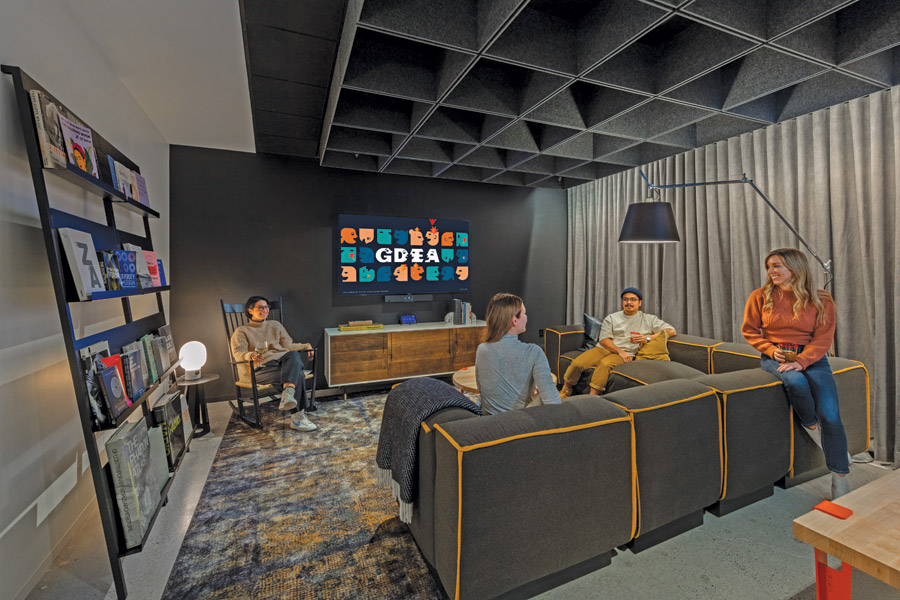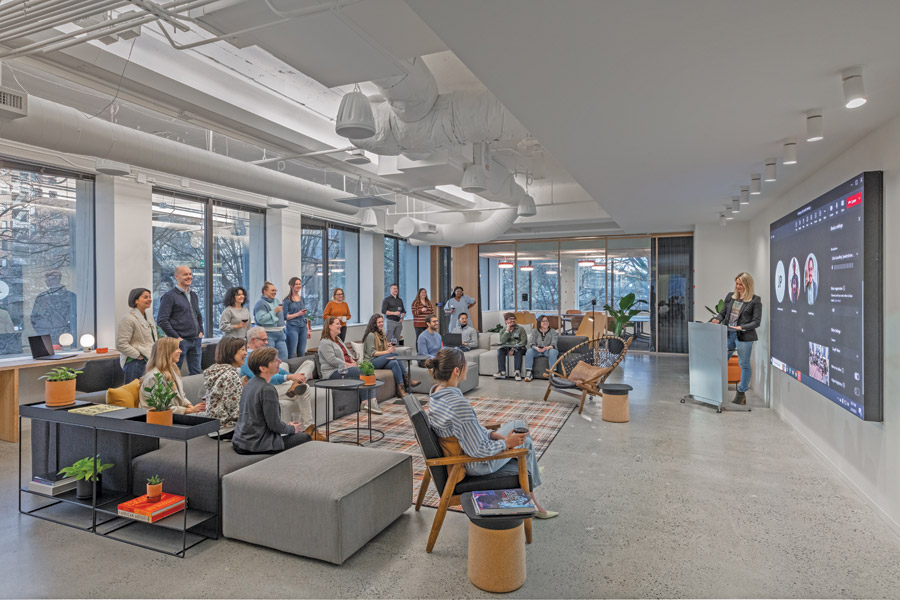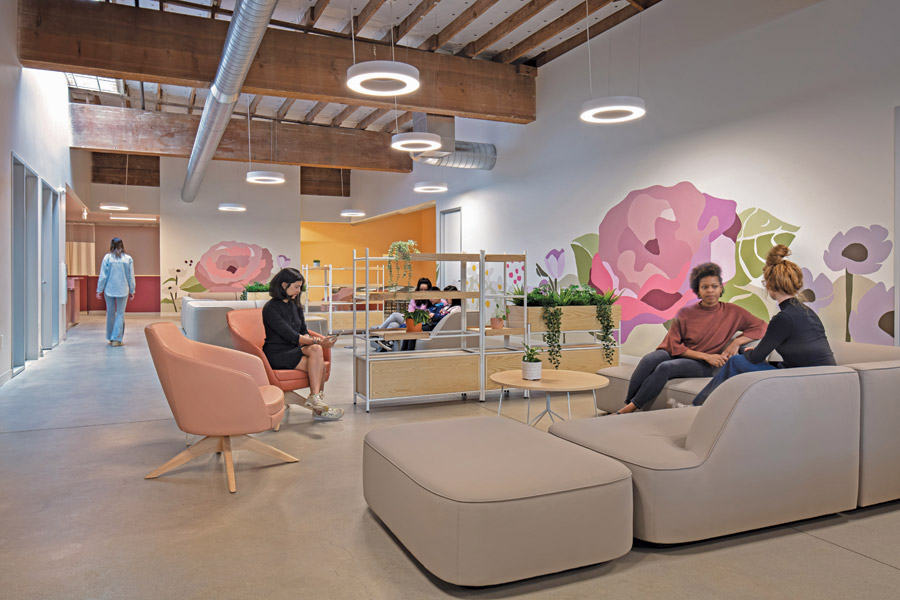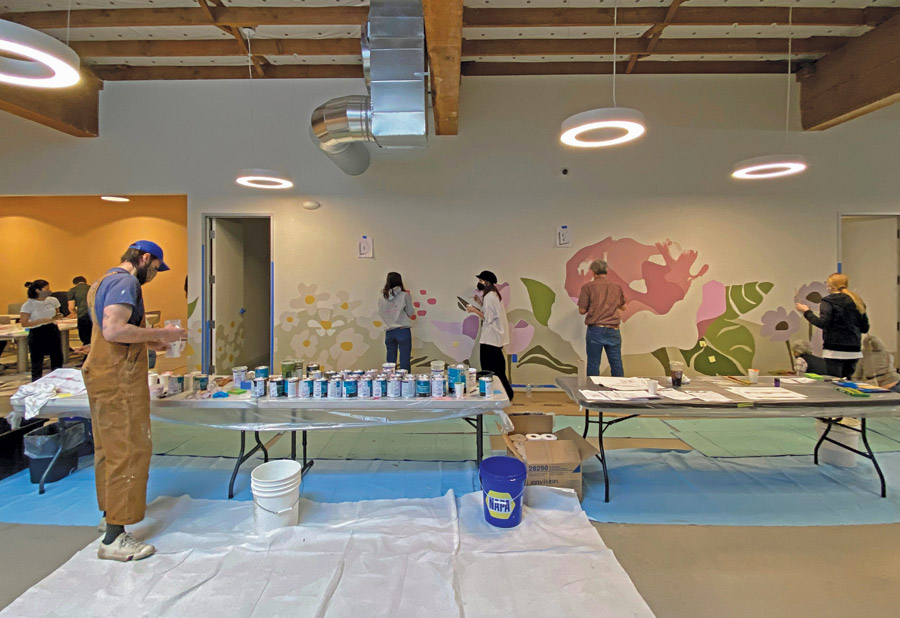In 2020, when the pandemic prompted many architects in the region to put down their pencils, Gensler leaned heavily into mining data. Along with its design capabilities, Gensler has established a strong in-house market research presence over the years. At a time when clients were scrambling for answers, Gensler was able to step in and offer insights—often through free reports—that would help guide owners and developers through the fog of uncertainty. When work picked up, Gensler found itself in position to leverage the relationships it fostered through the down times and capitalize on new opportunities.
In Gensler’s Northwest offices, that included a surge in work with science-based clients in both specialty laboratory buildings and lab interiors. In 2022, it reaped the rewards with $51.3 million in regional revenue—a 33% jump from 2021—placing it 11th on the Top Design Firms list. In light of the company’s savvy strategies, which helped it grow coming out of the pandemic, ENR Northwest named Gensler its Design Firm of the Year.
Kristin Jensen, principal and managing director of Gensler’s Seattle office, says uncertainties about the future of work that arose during the pandemic were paralyzing for many of its clients. Leaning on its internal Gensler Research Institute, the firm was able to respond with data and insights in the areas of workplace, education, science, residential, hospitality and other sectors. In many cases, its research was released in free reports that anyone, including competitors, could access.

During the pandemic, Gensler redesigned its Seattle office, creating a lab where it could test its own concepts.
Photo by Heywood Chan
Actionable Research
“A big way that we differentiate ourselves as a firm is that our design is rooted in the research that we do,” says Jensen. “We really doubled down on how we communicate that out, particularly during the pandemic. It was a great opportunity to get our research out there and get our voice out there, not just on the future of work, but the future of everything.”
At Gensler’s Portland office, which opened just over a year before the pandemic hit, that ability to share valuable research with local clients helped firm up its footing in the market.
“For us in Portland, compared to other firms here, we were able to offer this incredible wealth of knowledge and expertise in research from a leading international firm and that truly was something unique in this market,” says Maurice Reid, co-studio director in Gensler’s Portland office.
Armed with actionable research, Gensler makes concerted efforts to have more in-depth conversations with clients about how design can best meet their needs.
“Instead of asking what kind of spaces does the client need, we ask, why do they need these spaces? What will it do for you from a business perspective? What are the key success metrics associated with this project?” says Ryan Haines, principal and co-managing director of Gensler’s Seattle office. “Clients we work with come to understand that we look at design differently. We do great design, but we do it for the right reasons. We’re really getting to know their business, not just their program.”

In imagining its new office space, Gensler implemented pilot studies and leveraged survey data about where employees best focus, collaborate, mentor, learn and grow.
Photo by Heywood Chan
Client Connection
Gensler’s depth of knowledge beyond pure design helped it win the 1-million-sq-ft T-Mobile Headquarters Campus project in Bellevue, Wash., says Carol Reifsnyder, T-Mobile’s director of workplace strategy and design. Completed in early 2022, Gensler’s scope included master planning, brand design, workplace interiors and core and shell renovation.
“We went with Gensler because they have a robust workplace strategy research element,” she recalls. “They took three months and they conducted interviews at various levels of leadership. They did an all-employee survey. They held focus groups with whomever wanted to come. Then, they followed up with a pretty lengthy report that we were able to use to take to leadership.”
“We do great design, but we do it for the right reasons.”
— Ryan Haines, Principal and Co-Managing Director, Gensler
In addition, Reifsnyder says that Gensler was able to offer market insights about what other tech companies were doing and how T-Mobile would compare. “We had really started to compete with more tech companies—like Google, Microsoft and Amazon—for employees,” she says. “Gensler was able to do benchmarking on both a local and national scale around what other tech firms were doing.”
Gensler’s propensity for design backed by data isn’t limited to large national clients. During the early months of the pandemic, Gensler’s Portland office took on a 10,000-sq-ft pro bono project to design a new facility for Rose Haven Day Shelter and Community Center in Portland. Rose Haven, which annually provides support for more than 3,000 people experiencing homelessness and poverty, had outgrown its existing space in the basement of a church.
The new facility, which triples its space, includes a welcoming intake and reception area, guest services area, activity rooms, prep-kitchen and pantry, community dining room, wellness area with showers, laundry and medic room, a boutique-inspired space where guests can select donated clothing items and offices for Rose Haven’s team.
“They encouraged us to start with what our dream would be,” says Katie O’Brien, executive director of Rose Haven. “Then, they built on those initial visions by talking to our guests and talking to our staff, making sure that the space was what they wanted. They really went to great lengths to be inclusive in their design and thoughtful about their design of this space at all levels and most importantly with the people we’re serving. They set a bar for us that we wouldn’t have set for ourselves.”

The 10,000-sq-ft Rose Haven Day Shelter and Community Center project in Portland tripled the agency’s available space to support people experiencing homelessness and poverty.
Photo by Stephen A. Miller
Drive to Diversify
Although Gensler is widely known for its capabilities in the workplace, its Northwest offices have made a concerted effort over the years to significantly diversify the markets they serve. Since the Seattle office opened 23 years ago, the firm has been able to create a strong foothold in the tech sector. However, Haines says that about five years ago, the office pushed deep into other sectors, such as science, education and multifamily residential.
“It was very intentional to have that diversity of practice,” Haines says. “And when the tech sector slowed late last year, we had work in these other sectors continuing on.”
In the science sector, Gensler’s Northwest offices have seen revenue triple in recent years, in part thanks to its ability to tap into firmwide clients such as lab developers Alexandria Real Estate and Lincoln Property Co. Haines says that in many ways, the science sector is similar to the tech sector in its pursuit of talent. Beyond building labs, companies are focused on the employee experience to draw great scientists. To help in those efforts, Gensler also taps into its expertise with workplaces and even hospitality.
Although Gensler is deeply rooted in workplace design, it’s not set in its ways. During the pandemic, the firm took the opportunity to rethink the future of work. As part of that effort, the firm redesigned its Seattle office, essentially creating a lab to test its own concepts. The office concept centers on the idea of “workshop,” creating a “non-precious” space to experiment and collaborate. Just as it would with its clients, the firm implemented pilot studies and leveraged survey data about where employees best focus, collaborate, mentor, learn and grow, Haines says. The concept went through multiple redesigns and, even after completion, work continued as it evaluated employee utilization of spaces, desk sharing and other concepts. Today, the Seattle office doubles as a showroom, where clients can see how its concepts become reality.

Gensler staff and members of the community rallied to paint murals at the Rose Haven Day Shelter and Community Center project.
Photo courtesy Gensler
New Challenges, New Opportunities
After successfully navigating the pandemic, Gensler faces a new set of challenges as many of its clients grapple with higher interest rates. Still, several sectors remain strong, such as life sciences and public sector work. The firm is also very active in helping clients reposition current building stock. Gensler developed a dashboard calculation tool several years ago that can help it evaluate building stock in minutes rather than weeks or months.
Reid says the tool has been helpful in Portland and other cities where agencies are considering the conversion of unused office spaces to residential spaces. “This will help drive major policy decisions and zoning changes to help revitalize the downtown core,” he adds.
“[Gensler] set a bar for us that we wouldn’t have set for ourselves.”
— Katie O’Brien, Executive Director, Rose Haven
Although Gensler doesn’t expect 2023 revenue to be as robust as 2022, Karen Thomas, Gensler’s NW regional managing principal sees opportunities ahead. “What I’m feeling is the Northwest was in the soup a little bit early, so I am optimistic that we’ve seen the bottom,” she says. “We are certainly battening down the hatches on the expense side. We’re certainly staying super close to our clients.”
And just like it did during the depths of the pandemic, Gensler will lean into the tools that could help it grow coming out of any downturn. Thomas says that even though the firm is keeping a close eye on expenses, it continues to recruit talent and will put more than 10% of profits back into research.
“We continue to make those investments that we know will help us come out the other side,” she says. “I wake up buzzing every morning with the opportunities ahead of us and where we can see the shift, where we can start changing things in an altruistic way—not just for us and for our clients. Society at large needs so much from all of us right now.”





Post a comment to this article
Report Abusive Comment